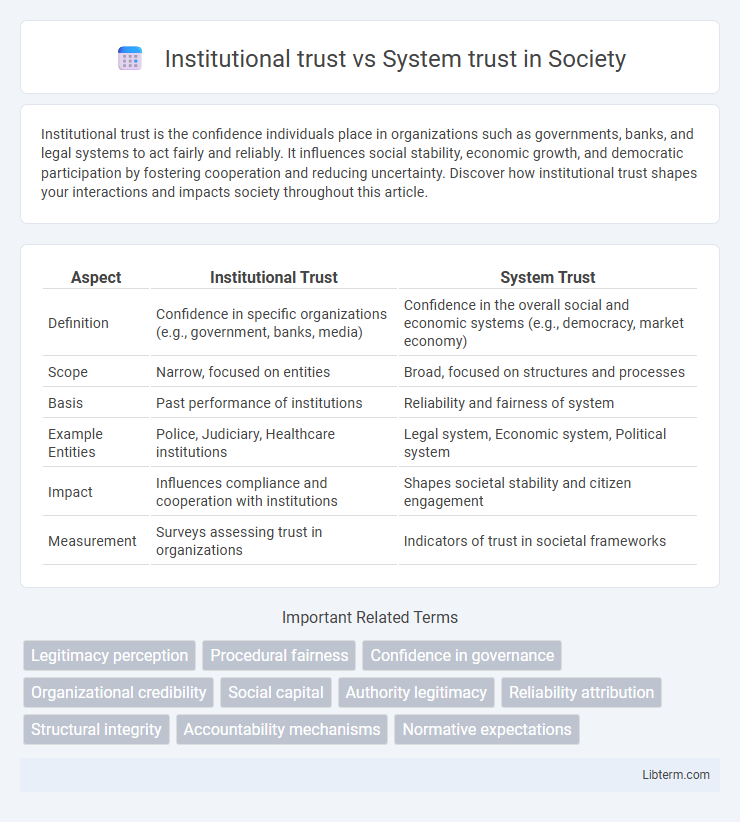Institutional trust is the confidence individuals place in organizations such as governments, banks, and legal systems to act fairly and reliably. It influences social stability, economic growth, and democratic participation by fostering cooperation and reducing uncertainty. Discover how institutional trust shapes your interactions and impacts society throughout this article.
Table of Comparison
| Aspect | Institutional Trust | System Trust |
|---|---|---|
| Definition | Confidence in specific organizations (e.g., government, banks, media) | Confidence in the overall social and economic systems (e.g., democracy, market economy) |
| Scope | Narrow, focused on entities | Broad, focused on structures and processes |
| Basis | Past performance of institutions | Reliability and fairness of system |
| Example Entities | Police, Judiciary, Healthcare institutions | Legal system, Economic system, Political system |
| Impact | Influences compliance and cooperation with institutions | Shapes societal stability and citizen engagement |
| Measurement | Surveys assessing trust in organizations | Indicators of trust in societal frameworks |
Understanding Institutional Trust
Institutional trust refers to the confidence individuals place in organizations such as governments, banks, and educational institutions to act reliably and ethically. It is shaped by factors like transparency, accountability, and historical performance, influencing public cooperation and societal stability. Differentiating it from system trust, which is broader confidence in societal structures and processes, understanding institutional trust helps improve governance and public policy effectiveness.
Defining System Trust
System trust refers to the confidence individuals place in established structures, processes, and technologies to function reliably and fairly without personal interaction. Unlike institutional trust, which depends on the perceived integrity and competence of specific organizations or people, system trust is grounded in belief in the design, rules, and consistency of the system itself. This form of trust is critical for the smooth operation of complex societies, enabling cooperation and reliance on automated or bureaucratic mechanisms.
Key Differences Between Institutional and System Trust
Institutional trust refers to confidence in specific organizations such as government bodies, banks, or educational institutions, while system trust denotes faith in the broader mechanisms and frameworks that govern societal functions, like legal or economic systems. Key differences include the scope of trust, with institutional trust targeting individual entities and system trust encompassing overarching structures; the basis of trust, as institutional trust relies on organizational performance and transparency, whereas system trust depends on the perceived fairness and reliability of societal rules. Moreover, institutional trust can fluctuate rapidly with organizational changes, but system trust tends to evolve gradually, reflecting long-term stability or reform.
Historical Perspectives on Trust in Society
Institutional trust refers to the confidence individuals place in entities like governments, legal systems, and educational bodies, shaped by the institutions' historical performance and integrity. System trust encompasses broader faith in the social, economic, and political frameworks that govern daily life, often influenced by historical stability and societal norms. Historical perspectives reveal that periods of crisis or reform significantly impact both institutional and system trust, highlighting the interconnected evolution of cultural trust mechanisms over time.
Factors Influencing Institutional Trust
Factors influencing institutional trust include transparency, accountability, and consistent performance in fulfilling roles. Public perception is shaped by effective communication, fairness in decision-making, and historical reputation. Social, cultural, and economic contexts also significantly affect the level of trust individuals place in institutions.
Elements Shaping System Trust
System trust is shaped by elements such as transparency, reliability, and consistent performance of the institution or technology. User experience, perceived fairness, and effective communication also play crucial roles in reinforcing system trust, ensuring users feel confident in the system's predictability and security. Trust is further influenced by institutional accountability mechanisms and the system's ability to adapt and respond to feedback or failures.
Impact of Institutional Failures on Public Confidence
Institutional trust depends on the belief that organizations and authorities will act competently and ethically, while system trust relates to confidence in the functioning of broader societal structures. Institutional failures, such as corruption scandals or regulatory breakdowns, significantly erode public confidence by undermining the perceived integrity and effectiveness of key institutions. This erosion often leads to decreased civic engagement, increased skepticism, and challenges to social cohesion and governance stability.
System Trust in the Digital Age
System trust in the digital age revolves around confidence in technological infrastructures, algorithms, and platforms that facilitate everyday transactions and interactions. This trust hinges on the reliability, security, and transparency of systems such as blockchain networks, cloud computing services, and AI-driven decision-making tools. Ensuring robust cybersecurity measures and clear data governance frameworks is essential to maintaining user trust in digital ecosystems.
Rebuilding Trust: Strategies and Challenges
Rebuilding institutional trust requires transparent communication, consistent accountability, and active stakeholder engagement to address past failures and demonstrate reliability. System trust depends on the robustness of policies and technologies that ensure fairness, security, and efficiency within the operational framework. Challenges include overcoming information asymmetry, managing public skepticism, and integrating feedback mechanisms to foster long-term confidence across both institutional and systemic levels.
The Future of Trust: Navigating Institutional and Systemic Confidence
Institutional trust hinges on belief in organizations like governments, banks, and healthcare, while system trust emerges from confidence in the interconnected frameworks enabling societal functions such as technology networks and legal systems. The future of trust demands adapting to challenges like digital transformation, misinformation, and evolving socio-political dynamics, emphasizing transparency, accountability, and resilience across both institutional and systemic levels. Building robust mechanisms to enhance data security, ethical governance, and inclusive participation will shape sustainable trust in complex, rapidly changing environments.
Institutional trust Infographic

 libterm.com
libterm.com